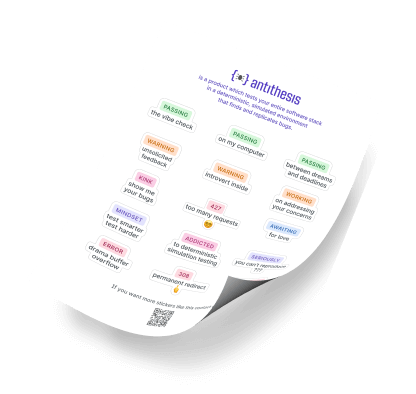Antithesis and the open source community
As every seasoned developer knows, your system is only as solid as its dependencies, and most of us have some open source dependencies in our code.
At Antithesis, for instance, we rely on open source for everything from our internal Nix tooling to core components of our product like our deterministic hypervisor, a fork of FreeBSD. Maintaining these tools requires countless hours of work from talented, dedicated developers worldwide. We believe supporting this community is not only the right thing to do, it’s also a vital way of ensuring our dependencies are, well, dependable! Writing quality code takes time, money, and skill, and we believe in supporting the open source community with all of them.
Our support for open-source software takes two main forms:
- We’re directly funding maintainers and communities as part of the Open Source Pledge, to ensure the sustainability of vital projects.
- And while money’s important, we think the work we do testing open source software is even more impactful and far reaching.
Our Open Source Pledge for 2025
The Open Source Pledge initiative requires a minimum pledge of $2,000 per developer on staff per year. This year, we provided $110,000 of direct financial support to open source projects, $2,895 per developer on staff:
- We provided the Nix core team with $95,000 through our partnership with Tweag.
- We provide $6,000 annually to Colin Percival for his crucial work on FreeBSD.
- We’ve provided $9,000 this year to support the development of Kurtosis, an open-source “docker compose for blockchain infrastructure.”
Many projects are supported by a single, dedicated maintainer, and this kind of funding is vital not just to paying them for their time, but also on a purely human level. It lets people know they’re not alone, and that their work is appreciated in the wider world. In some ways, that’s even more important and motivating!
Testing open-source software
A lot of the software that underpins cloud computing is open source – and because Antithesis is the only way to reliably verify complex distributed systems, many of the projects and companies in this space work with Antithesis.
Our partners in this space range from foundational projects like etcd to companies like MongoDB and Turso that create open source products, to open source blockchains like Cardano and Ethereum, to closed source customers who want to test their open-source dependencies. We’ve helped all these teams find and fix critical bugs, not just in their own software, but in massive, well-tested projects like Apache Spark, Aeron Cluster, Apache Kafka, etcd, NATS, and more.
Each bug we find and report represents a significant time saving for the maintainers. It’s not just the opportunity to fix an issue before it evolves into an incident, but that these are deep, complex issues that would otherwise be extremely difficult to test for and debug, and Antithesis can provide them with full, replayable reproductions.
Enabling open source communities
Finally, there’s an important second-order effect that happens when we test open-source projects: better testing empowers developer communities.
Working on large, complex codebases can be intimidating. Sure, you know your code is going to get reviewed and reviewed again before it finally merges, but those reviews take time and expertise, and maintainers only have so much capacity. Effective software verification alleviates some of that burden. If you’re sure your tests actually will catch the important issues, the scope of what lower-context developers can do increases, and devs can approach making changes with less trepidation, knowing that their changes will be verified before hitting production.
In some communities, this effect is organic. When we began testing etcd, there was an upswell of community interest in working on the project on the CNCF slack. Other communities, especially blockchains, use this more deliberately. Cardano, for instance, encourages developers to create new node designs, and gives them access to Antithesis to ensure that the new node architectures are safe as well as diverse. They’ve open sourced their Antithesis tests with the goal of having developers contribute new ones as their node network grows.
Either way, the outcome is the same: a more energized, empowered developer community.
Open-source software is people
At Antithesis, we want to support the human communities behind open source software. We do this both financially, through initiatives like the Open Source Pledge and Github sponsorships, and in non-financial ways, by making it easier for developers to engage with open-source projects.
We’re continually grateful for the dedication of open source maintainers: thank you all, and please know that you can count on our continued support.





